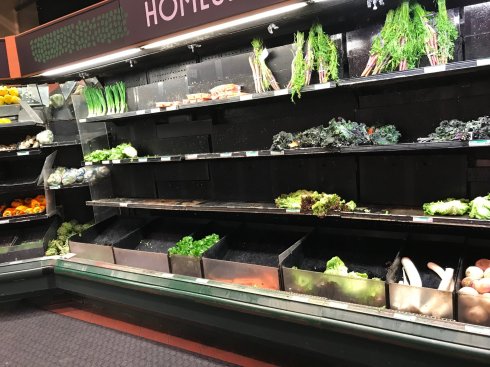
Posted on 01/19/2018 6:17:46 AM PST by grundle
Whole Foods used to keep a large amount of extra stock in back rooms and freezers so it could restock its shelves as soon as merchandise was sold (which pretty much all supermarkets do). However, according to Business Insider, the chain has recently gotten rid of that policy, and replaced it with a new policy that transfers items directly from delivery trucks to store shelves. This is causing many store shelves to be empty.
This new policy was started prior to the chain’s recent purchase by amazon.
Whole Foods says it adopted this new policy in order to save money.
The fact that it is causing many customers to abandon the chain and switch to a different one does not, for whatever weird reason, seem to be of concern to the chain’s high level executives. Apparently, their only concern is saving money.
Here are some pictures from Whole Foods stores across the country:

A Whole Foods store in Houston.

A Whole Foods store in West Hartford, Connecticut.

A Whole Foods store in Boston.

A Whole Foods store in New York City.
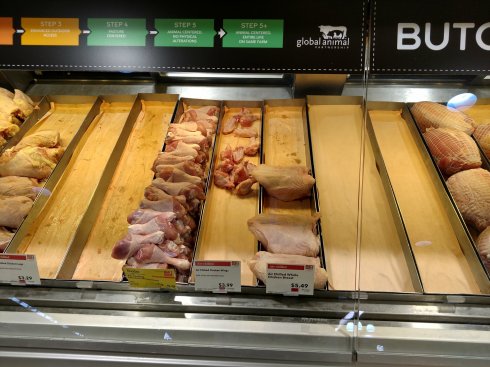
A Whole Foods store in Boston.
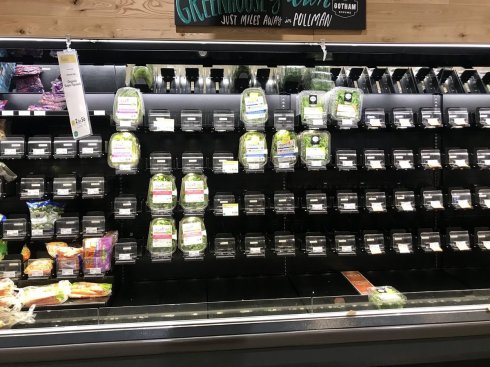
A Chicago Whole Foods store.
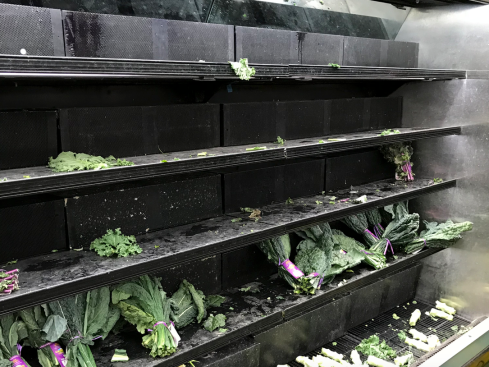
A Whole Foods store in West Hartford, Connecticut.
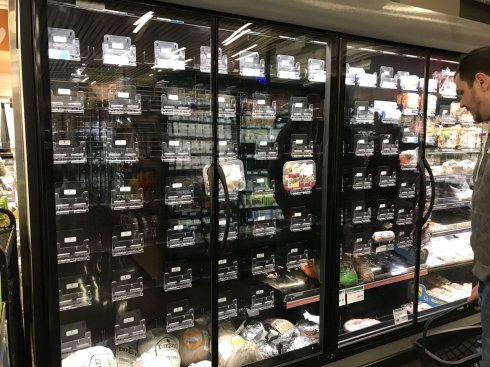
A Whole Foods store in San Francisco.
Well, we’ve got a lot of grocery options in our area, but the grocery stores are stocking fewer brand names and more house brand. The house brands tend to be higher in sugar, salt, or the quality isn’t as good, and the savings not that great. I cook mostly from scratch, but I want brands I trust and we go to Wally to get those.
My company had several Whole Foods as clients. As such I had many occasions to be in the back rooms of the stores.
There were people cleaning grading sprucing up the produce before it ever got to the display shelves.
They tossed anything not top quality.
Their prices reflected the care they took.
Can’t imagine the store keeping their usual clientele, if they even want to.
We stocked all of the dairy at our location. We had to work certain aisles first to be finished in time for the outside vendors who usually came in around 4:00 am.
We stocked all of the Sam’s soft drinks. We didn’t handle beer and wine either although a few cases of some beer was occasionally in the cooler.
We also did all of the health/beauty stuff, and all of the sporting goods with the exception of secure ammunition and firearms. Electronics restocking was done inhouse on day shift.
Because their sales and market share were dropping. Typically the “hold less stock” moves comes because a company can’t actually afford to maintain previous stock levels.
We do 95% of our cooking from scratch, too. Much cheaper and more nutritious. Plus we can and dry a lot of stuff for long term storage. We like a well stocked larder, just in case.
We are fortunate in that we can comparison shop and get the best deals. We have a Costco literally across the street from us. Buy in bulk, break it down, can, dry, vacuum seal and freeze, whatever it takes to save a few bucks. Right?
L
Running a grocery store - and running Amazon - are totally different skill sets. Amazon should have ‘made a deal’ with a story like Publix to design a ‘home delivery’ system that worked.
Publix has one now - delivery within an hour - and it’s working just fine...
This is what happens then bean counting MBA consultants get their hooks into running a company.
They’ll write it up as a transformative case study.
Those are pictures of fully stocked stores in Venezuela.
Likely the ultra-lib Whole Foods shoppers enjoy shopping with empty shelves as they prepare for their socialist utopia.
You might have something there. Publix has a quarter of the locations that Walmart does and is only in seven states. I doubt the delivery system would work in rural areas with less population density. Walmart still wins on purchasing power.
Amazon will always be my priority. I never heard of jet.
That’s called “Just in Time” (JIT) in non-perishable industry.
Yup, they don’t want to use money to rent/buy space to store the extras, or the 2x trip labor to move from truck, then from storage.
At least they say up front they want to save money, instead of the usual bogus “we’re being green” or “more fresh & healthy” which all the lemmings fall for so they look good instead of pathetic.
Assuming this is even a true representation of what’s going on, it’s most likely due to greater than expected success, like the GOP website for the Fakie awards crashing.
I do know that empty shelves is not the case at all for our local Whole Foods store, but the number of shoppers there IS up DRAMATICALLY than before the price decreases.
Personally, I hadn’t stepped into a Whole Foods for over a decade, but the price decreases made me curious, and I discovered they have rotisserie chickens that haven’t been brined to death in a nasty chemical soup like everywhere else.
Sure, they still cost a couple of bucks more than others, but we get four person-meals out of one that is both delicious and healthy, and still far cheaper than four junk food fast food meals and is a nice change of pace from cooking every meal ...
Actually in theory it makes a good deal of sense.
They could’ve sold this as “we’re being more healthy for you - fresh!” because it’s off the truck rather than another stage of sitting around in storage.
But they were honest.
Problem is, they BETTER have trucks at the beck & call as soon as anything runs out. They need a system to handle it. Looks like they are not.
Thanks for your info,
As a retiree customer, I’m never in our local Walmart before about noon let alone before 4 am.:)
Booger magnets
I like nipple rings though
My wife was like ok big shot you get a Prince Albert and I’ll get nipple rings..deal?
Needless to say no nipple rings in this marriage
One of the reasons the Publix system works is because they have a higher density of stores in their test areas... Walmart’s the opposite - their ‘warehousing mentality’ is known for amazing supply chain management. A style that doesn’t lend itself to small personal ‘people heavy’ distribution.
Someone will figure it out in the future - using robots and drones - but it appears Amazon can’t do it at this time.
“Apparently, their only concern is saving money.”
MBAs, IMO, are the ruination of many a business. You go into business to fill a perceived need and hopefully make money. If you go into it just to make money, you won’t last long.
“We do 95% of our cooking from scratch, too. Much cheaper and more nutritious. Plus we can and dry a lot of stuff for long term storage. We like a well stocked larder, just in case.”
“We are fortunate in that we can comparison shop and get the best deals. We have a Costco literally across the street from us. Buy in bulk, break it down, can, dry, vacuum seal and freeze, whatever it takes to save a few bucks. Right?”
You sound like my wife and me. With the once weekly exception of a can of Progressive soup for lunch, most of our meals are from scratch. We wait for the Progressive soup to go on sale at 90 cents per can versus $3+ per can to buy several cans of our favorites on sale.
It takes us about 15 minutes to unpack our monthly’s Costco bulk beef, pork, lamb, chicken, ocean salmon and other seafood and re wrap for our freezer.
If our local Raleys or Safeway has fresh seafood on sale, we buy their sale items and freeze it after serving some for dinner. An example at Raley’s today, Fresh Dungeness Crabs for $4 per pound.
“We do 95% of our cooking from scratch, too. Much cheaper and more nutritious. Plus we can and dry a lot of stuff for long term storage. We like a well stocked larder, just in case.”
“We are fortunate in that we can comparison shop and get the best deals. We have a Costco literally across the street from us. Buy in bulk, break it down, can, dry, vacuum seal and freeze, whatever it takes to save a few bucks. Right?”
You sound like my wife and me. With the once weekly exception of a can of Progressive soup for lunch, most of our meals are from scratch. We wait for the Progressive soup to go on sale at 90 cents per can versus $3+ per can to buy several cans of our favorites on sale.
It takes us about 15 minutes to unpack our monthly’s Costco bulk beef, pork, lamb, chicken, ocean salmon and other seafood and re wrap for our freezer.
If our local Raleys or Safeway has fresh seafood on sale, we buy their sale items and freeze it after serving some for dinner. An example at Raley’s today, Fresh Dungeness Crabs for $4 per pound.
Maybe the shortages are not affecting Connecticut for some reason.
Disclaimer: Opinions posted on Free Republic are those of the individual posters and do not necessarily represent the opinion of Free Republic or its management. All materials posted herein are protected by copyright law and the exemption for fair use of copyrighted works.